★★★½
“Peak women-in-prison.”
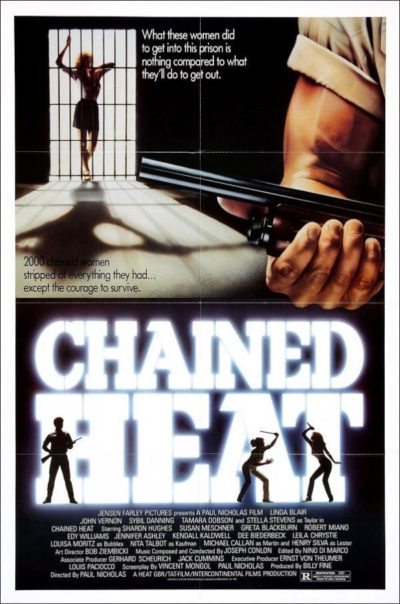
This may not be the best women-in-prison film, but it’s pretty much iconic. It certainly stamped the template from which almost all would follow. Carol Henderson (Blair) is sentenced to a relatively short 18 months in prison, for her involvement in a fatal car accident, only to find life on the inside is far, far harder than expected. Hazards to be navigated include those on both sides of the bars. There’s the predatory and drug-running warden (Vernon), who has a jacuzzi in his office – bit of a warning sign that. Then there’s his assistant Captain Taylor (Stevens), who is pimping out inmates with the help of Lester (Henry Silva). Meanwhile, a race war is about to break out among the inmates, between the groups led by Ericka (Danning) and Duchess (Tamara Dobson), with Carol caught in the middle.
It’s a stellar cast for an exploitation movie, also including the former Mrs. Russ Meyer, Edy Williams, and the insanely hot Monique Gabrielle as the first inmate to frolic with the warden in his watery play-pen, despite him being more than 30 years older. The nudity is copious, frequent and more explicit than you might expect, especially if you find an uncut version. There is at least one scene of sexual assault which even I found made for uncomfortable viewing. I’d prefer to have had more of the struggle for power between Ericka and Duchess, which is a lot of fun to watch, both women having screen presence to spare.
In comparison, Blair has trouble standing out, choosing to underplay her role, when all around her are going in the opposite direction. This is where the “pinky violence” films from Japan stand out, with their heroines who are prepared to do whatever it takes to survive, and defeat those who stand in their way. Carol doesn’t get there until the very end, if at all, eventually brokering a rather unlikely alliance that sees Ericka join forces with Duchess, when they realize Taylor is the real enemy, rather than each other. Even more unlikely is the way Carol comes into possession of a convenient videotape, implicating Taylor and her crony in murder.
Still, if you are here for the plot, you may have strolled into the wrong review. Blair may have had her regrets, the IMDb saying she “stripped naked because she felt she had no choice.” That seems like a “you” problem, Linda. I’m fairly sure the rest of the cast had no such qualms and, as noted above, she’s likely the weakest link in the characters anyway. Even though it’s twenty minutes before Carol gets through processing and into her cell, it is fairly consistently entertaining, albeit not necessarily for the right reasons, and will likely open your eyes to the important cause of women’s penal reform. Or perhaps just cause you to question certain elements of security procedures in this particular prison. They don’t make ’em like this anymore; especially not with this cast.
Dir: Paul Nicholas
Star: Linda Blair, Stella Stevens, John Vernon, Sybil Danning





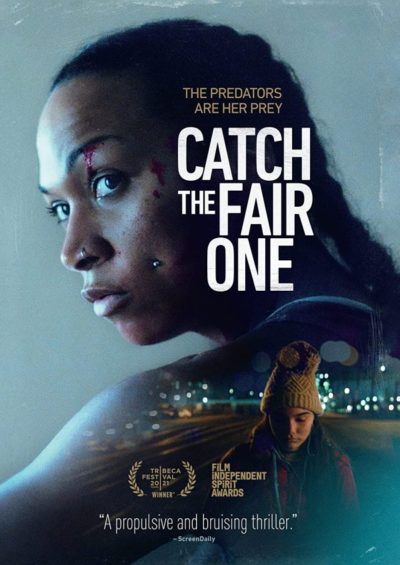 Quite often, in films featuring women who are supposed to be boxers, they simply do not look the part. Safe to say, this is not an issue here. That is apparent from the opening scene, in which Kaylee (Reis) is preparing for a fight. As she warms up with her trainer, the speed and power of her punches is clear, and not cinematic trickery. It’s unsurprising, since Reis is, at time of writing. the current WBA, WBO and IBO light-welterweight world champion. It’s just a shame this movie chooses not to make more use of her undoubted talents in the combat field, and is a tad too earnest to be value as entertainment.
Quite often, in films featuring women who are supposed to be boxers, they simply do not look the part. Safe to say, this is not an issue here. That is apparent from the opening scene, in which Kaylee (Reis) is preparing for a fight. As she warms up with her trainer, the speed and power of her punches is clear, and not cinematic trickery. It’s unsurprising, since Reis is, at time of writing. the current WBA, WBO and IBO light-welterweight world champion. It’s just a shame this movie chooses not to make more use of her undoubted talents in the combat field, and is a tad too earnest to be value as entertainment.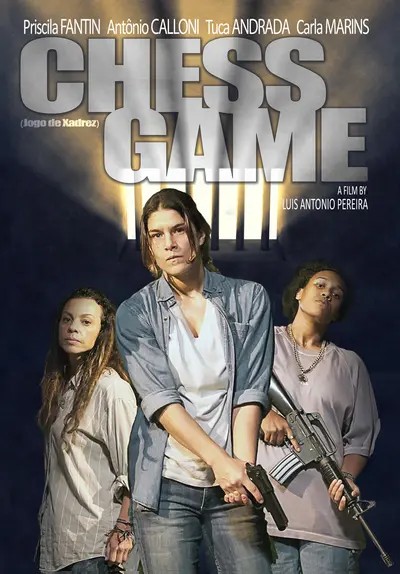 I had to work quite hard to see this: while it is on Tubi, the subtitles there were only in Spanish, and so not much help (I’m still at the “Donde esta la biblioteca?” level). Fortunately, it then turned up on Vudu, and I bravely made my way through their crappy interface and frequent adverts to bring you this review. It was worth it. This is a solid slice of women-in-prison action/drama from Brazil, though perhaps less exploitative than I expected (especially given the country’s history in the sub-genre!) . I mean, Marins is a former model in Brazillian Playboy, so you’ll understand I had… certain expectations. Fortunately, the rest of the movie proved more than adequate to hold my attention.
I had to work quite hard to see this: while it is on Tubi, the subtitles there were only in Spanish, and so not much help (I’m still at the “Donde esta la biblioteca?” level). Fortunately, it then turned up on Vudu, and I bravely made my way through their crappy interface and frequent adverts to bring you this review. It was worth it. This is a solid slice of women-in-prison action/drama from Brazil, though perhaps less exploitative than I expected (especially given the country’s history in the sub-genre!) . I mean, Marins is a former model in Brazillian Playboy, so you’ll understand I had… certain expectations. Fortunately, the rest of the movie proved more than adequate to hold my attention. 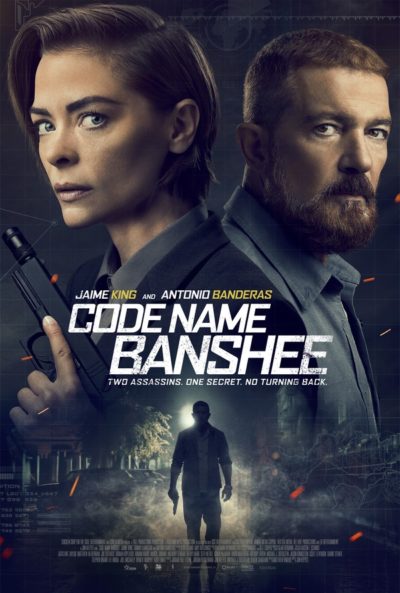 This seemed considerably better in the trailer, which makes it look like quite an action-packed extravaganza. The reality is much less interesting, with a murky and confusing plot, and what action there is, is often filmed in a murky and confusing way. It begins with an agent, code name Banshee (King), quitting the government agency for which she works. The handoff of an asset went wrong: one of the colleagues involved was her father, who vanished entirely. The other was Caleb (Banderas), who went off the grid thereafter. Five years later, Banshee is a private assassin, but her latest job is interrupted by Greene (Flanagan), who wants her to give up Caleb’s location.
This seemed considerably better in the trailer, which makes it look like quite an action-packed extravaganza. The reality is much less interesting, with a murky and confusing plot, and what action there is, is often filmed in a murky and confusing way. It begins with an agent, code name Banshee (King), quitting the government agency for which she works. The handoff of an asset went wrong: one of the colleagues involved was her father, who vanished entirely. The other was Caleb (Banderas), who went off the grid thereafter. Five years later, Banshee is a private assassin, but her latest job is interrupted by Greene (Flanagan), who wants her to give up Caleb’s location.  30 years old, Willa sees herself as an “old maid.” She’s the eldest of three half-sisters, daughters of peripatetic ne’er-do-well Finn Malone, who outlived two wives (and was deserted by a third) in the course of his wanderings, which in 1889 led him to a homestead in the small community of Sweet Clover. Like many of the townsfolk, he was heavily in debt to conniving banker Theodore Pierce, and used his land as collateral. But he’s now recently dead, murdered after he took off on his latest quest for gold. At the moment, the farm isn’t productive; without him, the sisters won’t be able to repay the loan, and they’ll lose their home within months.
His killer, though, has been identified as notorious outlaw Charlie Bangs, rumored to be hiding out in Indian Territory, and there’s a $1,000.00 price on his head. When Willa, early on, conceives the idea of tracking him down and claiming the bounty, nobody can talk her out of it. The idea’s not as hare-brained as some folks think. Tough and practical, “tomboy” Willa’s a good shot with a rifle whose hunting skills keep her family supplied with meat; she can ride, and she’s got guts. As even she recognizes, though, the enterprise she’s contemplating is a deadly dangerous one. At the very least, she’ll need the services of an experienced trail guide. Enter one Gideon Hartley.
Gideon’s about 35; he’s fairly new in town, but the reputation that precedes him confirms that he’s highly competent as a trail guide in rough terrain –when he’s sober. But his reputation also suggests (correctly) that he drinks a lot. In fact, his alcohol abuse problem is longstanding and deep-seated. He and Willa meet in Chapter 1. Surprisingly (or maybe not, depending on how familiar readers are with “romance” genre conventions; this was published under the “Love Inspired” imprint, though I approached it as a Western, and it works on those terms) there’s some chemistry between them; but neither is looking for that sort of thing, nor inclined to nurture it. More to the point, Willa’s not thrilled with the idea of a “drunk” for a guide; and Gideon (who hasn’t done any guiding for about a year) is pretty well convinced that he’s not up to the job and that Willa would be embarking on a suicide mission anyway. But before long, it becomes clear to her that he’s the only prospective guide she’s going to get, and to him that she’s going whether he goes with her or not.
Goodnight gives serious attention to developing her characters (including the secondary ones, along with our H/h) and bringing the community to life, and she takes the time needed to do that in depth. We don’t get started on our actual quest until a bit more than 200 pages in (and the book has 363 pages). Some readers, who expect the adventure of the trail to be the main warp and woof of the tale, won’t like this aspect. However, I fully appreciated the textured, in-depth approach. Both main characters (who alternate as viewpoint characters, though third-person narration is used throughout) are fully round and three-dimensional. Gideon in particular has a lot of psychological baggage, which is believable, and gradually disclosed.
Western-style action, once it kicks in, isn’t stinted; there are plenty of jeopardies on the trail, and the climactic confrontation will test our leading couple’s mettle on more than one level. (Willa doesn’t actually have to fire her rifle, but she displays her action heroine moxie by handling a very physically challenging situation near the end with flying colors; I doubt if I’d been brave enough to do the things she did!) The author writes very well; her plotting is excellent, and her re-creation of the time and place masterful. (It features a cameo appearance by real-life person Bass Reeves, the first African-American deputy U.S. marshall.)
In keeping with the standards of the ECPA, this book poses no content issues for bad language, sexual content (we do have reference to prostitution, and to the ugly trade of sex trafficking, which is a very contemporary reality, but which goes back a lot longer than that), or ultra-gory violence. Christian faith (which both main characters were raised with, though Gideon’s faith has been long neglected) plays a positive role here, though the book isn’t “preachy” and delivers its spiritual messages by example.
I’d recommend this to fans of Westerns, Western romance, and clean (especially Christian) romance in general, as well as to fans of strong heroines. The story arc here is complete, and the book isn’t said to be part of a series (though I suspect that both of Willa’s sisters might eventually get her own sequel). Although some characters, such as Belle Holbrook, obviously have very intriguing backstories, I couldn’t find any indication that they were in prior books by the author. (But if they were, or if they eventually get prequels, I’d be interested in reading those books!)
Author: Linda Goodnight
Publisher: Love Inspired; available
30 years old, Willa sees herself as an “old maid.” She’s the eldest of three half-sisters, daughters of peripatetic ne’er-do-well Finn Malone, who outlived two wives (and was deserted by a third) in the course of his wanderings, which in 1889 led him to a homestead in the small community of Sweet Clover. Like many of the townsfolk, he was heavily in debt to conniving banker Theodore Pierce, and used his land as collateral. But he’s now recently dead, murdered after he took off on his latest quest for gold. At the moment, the farm isn’t productive; without him, the sisters won’t be able to repay the loan, and they’ll lose their home within months.
His killer, though, has been identified as notorious outlaw Charlie Bangs, rumored to be hiding out in Indian Territory, and there’s a $1,000.00 price on his head. When Willa, early on, conceives the idea of tracking him down and claiming the bounty, nobody can talk her out of it. The idea’s not as hare-brained as some folks think. Tough and practical, “tomboy” Willa’s a good shot with a rifle whose hunting skills keep her family supplied with meat; she can ride, and she’s got guts. As even she recognizes, though, the enterprise she’s contemplating is a deadly dangerous one. At the very least, she’ll need the services of an experienced trail guide. Enter one Gideon Hartley.
Gideon’s about 35; he’s fairly new in town, but the reputation that precedes him confirms that he’s highly competent as a trail guide in rough terrain –when he’s sober. But his reputation also suggests (correctly) that he drinks a lot. In fact, his alcohol abuse problem is longstanding and deep-seated. He and Willa meet in Chapter 1. Surprisingly (or maybe not, depending on how familiar readers are with “romance” genre conventions; this was published under the “Love Inspired” imprint, though I approached it as a Western, and it works on those terms) there’s some chemistry between them; but neither is looking for that sort of thing, nor inclined to nurture it. More to the point, Willa’s not thrilled with the idea of a “drunk” for a guide; and Gideon (who hasn’t done any guiding for about a year) is pretty well convinced that he’s not up to the job and that Willa would be embarking on a suicide mission anyway. But before long, it becomes clear to her that he’s the only prospective guide she’s going to get, and to him that she’s going whether he goes with her or not.
Goodnight gives serious attention to developing her characters (including the secondary ones, along with our H/h) and bringing the community to life, and she takes the time needed to do that in depth. We don’t get started on our actual quest until a bit more than 200 pages in (and the book has 363 pages). Some readers, who expect the adventure of the trail to be the main warp and woof of the tale, won’t like this aspect. However, I fully appreciated the textured, in-depth approach. Both main characters (who alternate as viewpoint characters, though third-person narration is used throughout) are fully round and three-dimensional. Gideon in particular has a lot of psychological baggage, which is believable, and gradually disclosed.
Western-style action, once it kicks in, isn’t stinted; there are plenty of jeopardies on the trail, and the climactic confrontation will test our leading couple’s mettle on more than one level. (Willa doesn’t actually have to fire her rifle, but she displays her action heroine moxie by handling a very physically challenging situation near the end with flying colors; I doubt if I’d been brave enough to do the things she did!) The author writes very well; her plotting is excellent, and her re-creation of the time and place masterful. (It features a cameo appearance by real-life person Bass Reeves, the first African-American deputy U.S. marshall.)
In keeping with the standards of the ECPA, this book poses no content issues for bad language, sexual content (we do have reference to prostitution, and to the ugly trade of sex trafficking, which is a very contemporary reality, but which goes back a lot longer than that), or ultra-gory violence. Christian faith (which both main characters were raised with, though Gideon’s faith has been long neglected) plays a positive role here, though the book isn’t “preachy” and delivers its spiritual messages by example.
I’d recommend this to fans of Westerns, Western romance, and clean (especially Christian) romance in general, as well as to fans of strong heroines. The story arc here is complete, and the book isn’t said to be part of a series (though I suspect that both of Willa’s sisters might eventually get her own sequel). Although some characters, such as Belle Holbrook, obviously have very intriguing backstories, I couldn’t find any indication that they were in prior books by the author. (But if they were, or if they eventually get prequels, I’d be interested in reading those books!)
Author: Linda Goodnight
Publisher: Love Inspired; available 
 I must confess I have not seen Confessions of a Homicidal Prostitute, to which this is a sequel. It’s marginally possible, I suppose, that the character development, story and nuance were present there, and explain why these are all but entirely absent in its successor. I would not, however, be prepared to bet on it. I suspect the original was every bit as mean-spirited as this: and “suspect” is all I’ll ever do, because I won’t be making any effort to track it down. In fact, I probably wouldn’t watch it if my aged mother begged me to on her death-bed. Too harsh? Perhaps. Yet I don’t think I’ve ever seen a flat-out
I must confess I have not seen Confessions of a Homicidal Prostitute, to which this is a sequel. It’s marginally possible, I suppose, that the character development, story and nuance were present there, and explain why these are all but entirely absent in its successor. I would not, however, be prepared to bet on it. I suspect the original was every bit as mean-spirited as this: and “suspect” is all I’ll ever do, because I won’t be making any effort to track it down. In fact, I probably wouldn’t watch it if my aged mother begged me to on her death-bed. Too harsh? Perhaps. Yet I don’t think I’ve ever seen a flat-out 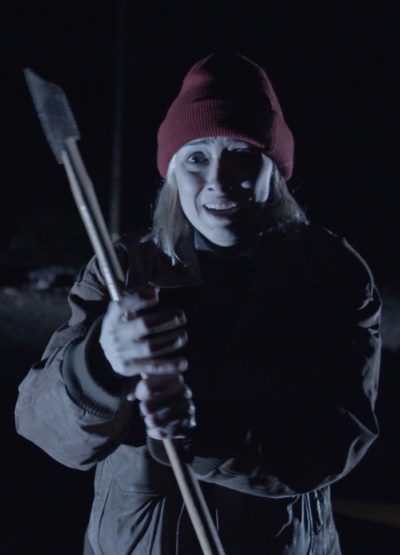 Yeah, the scale here is a bit smaller than the Spielberg classic, to put it mildly. As in… there’s precisely one (1) velociraptor. For reasons that are a bit unclear, this is roaming a deserted Wild West attraction on the road to Los Angeles. Heading to LA are wannabe stand-up comic Julia (Walker) and her flamingly gay best friend, Kyle (Rennie). An accident forces them off the road, and with – what a surprise! – no cell signal, they are forced to seek help at the previously mentioned attraction, where Ray (Mede) is the only inhabitant, and is acting a bit odd. Turns out, there’s good reason for this, with a large, carnivorous prehistoric reptile roaming the facility, the work of a mad scientist (Mertz). Will Julia
Yeah, the scale here is a bit smaller than the Spielberg classic, to put it mildly. As in… there’s precisely one (1) velociraptor. For reasons that are a bit unclear, this is roaming a deserted Wild West attraction on the road to Los Angeles. Heading to LA are wannabe stand-up comic Julia (Walker) and her flamingly gay best friend, Kyle (Rennie). An accident forces them off the road, and with – what a surprise! – no cell signal, they are forced to seek help at the previously mentioned attraction, where Ray (Mede) is the only inhabitant, and is acting a bit odd. Turns out, there’s good reason for this, with a large, carnivorous prehistoric reptile roaming the facility, the work of a mad scientist (Mertz). Will Julia 
